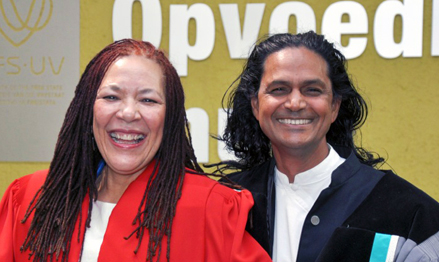Latest News Archive
Please select Category, Year, and then Month to display items
14 May 2024
|
Story ANTHONY MTHEMBU
|
Photo Supplied
 Contemporary artist Ibrahim Mahama engaging with students during his visit to the Department of Fine Arts at the University of the Free State (UFS).
Contemporary artist Ibrahim Mahama engaging with students during his visit to the Department of Fine Arts at the University of the Free State (UFS).
Ghanaian contemporary artist, Ibrahim Mahama, visited the Department of Fine Arts at the University of the Free State (UFS) to share insights with staff and students during his stay in the country.
Dr Adelheid Von Maltitz, Senior Lecturer in the Department of Fine Arts at the UFS, highlighted the significance of Mahama’s visit which took place from 21 to 28 March 2024, marking the first instance of such interaction between a Fine Arts department in South Africa and Mahama. She remarked, “It is truly astounding that a person of his calibre dedicated time to focus on our department, and I believe this has catalysed a positive shift within our department.”
Mahama’s impactful presence at UFS
Dr Von Maltitz emphasised that Mahama’s visit aimed to offer staff and students a glimpse into his artistic process and mindset. During his time at the UFS, Mahama, who was virtually overseeing his latest recent large-scale artwork titled Purple Hibiscus, which involved wrapping the Barbican Centre in London, engaged extensively with staff and students from the department about their research. He shared insights into his creative journey, presented select works, and conducted critique sessions with fourth year and postgraduate students, among other activities. Dr Von Maltitz believes this interaction, particularly with students, has significantly bolstered their confidence as aspiring artists, preparing them for professional endeavours.
Broader implications and future prospects
Mahama’s visit not only energised the department’s academic environment but also holds broader implications. Dr Von Maltitz asserted that it will solidify the department’s identity nationally and create avenues for students to pursue residencies in countries like Ghana. Therefore, maintaining a fruitful relationship with Mahama remains a priority for the department.
Reflecting on the visit Dr Von Maltitz concluded, ‘’the key takeaway, especially for the students, was witnessing the potential of their works within the broader South African and international contexts. “
Rhodes professor calls for accountability in teacher education
2013-11-14
|
 |
Prof Jean Baxen of Rhodes University and Prof Dennis Francis, Dean of the Faculty of Education of the UFS.
Photo: Stephen Collett
15 November 2013 |
Lecture (pdf)
“Our education system needs quality teacher education.”
This was the message from Prof Jean Baxen, Deputy Dean of Research at Rhodes University in Grahamstown. She delivered the Education Public Lecture on ‘The lives of children, citizenship and teacher education: challenges and opportunities’ at the University of the Free State’s Bloemfontein Campus.
Growing up in White River, the rural areas of Eastern Transvaal (as it was previously known), Prof Baxen took the audience on a journey of the imagination. She shared stories of how she and fellow learners walked miles to get to school and how her son found himself in a situation of being unsure about his own racial identity, questioning what it meant to be ‘coloured’. She also related stories of how teachers are not sufficiently prepared to mediate information on HIV/Aids.
These stories revealed how little teachers cared, and also how difficult and challenging it is for learners to cope in such teaching and learning environments – thus calling for quality teacher education.
She stressed the fact that quality teacher education is needed in South Africa to assist in curbing the challenges children and fellow citizens come across in our broader society. “It is important that, as teacher educators, we should groom teachers to find and understand their identity, sexuality, and also the world they live in. There is an urgent need for us to hold ourselves and others accountable and to not distance ourselves and make it someone else’s responsibility – it is our joint responsibility as citizens,” she said.
We need a pedagogy that would navigate and start formulating a language that we could use to face these challenges, she proposed.